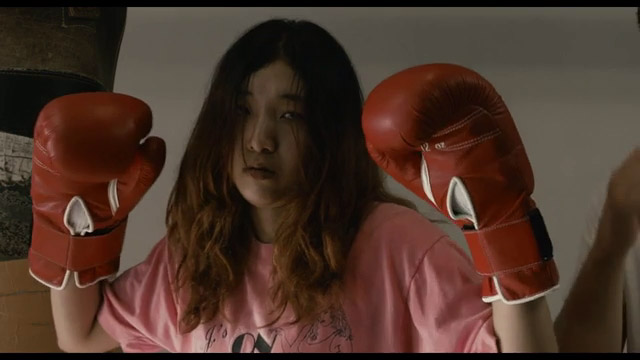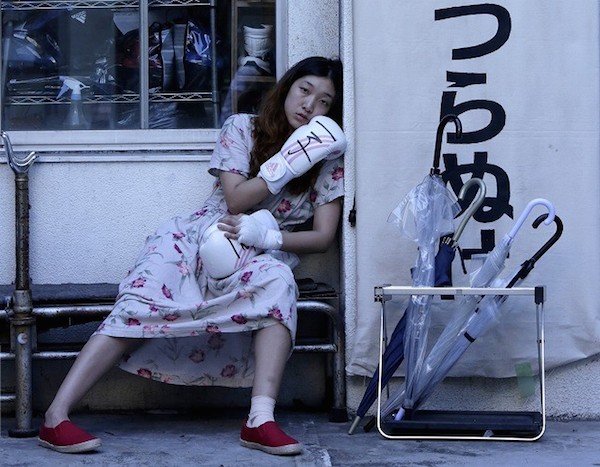100 Yen Love
Written by Shin Adachi
Directed by Masaharu Take
Japan, 2014
In some ways, the Japanese director Masaharu Take’s 100 Yen Love feels about as old-hat as the 12/8, bluesy guitar music which makes up the bulk of the film’s score: it’s yet another boxing drama about an outcast who finds herself in the ring. There’s nothing in the story we haven’t heard before, and, like the music, its willingness to rehash cliches makes it risk self-parody. But conveying art through established traditions can have a certain nostalgic charm, and both the music and the film it provides the soundtrack for play off tropes to create a crowd-pleaser which oozes appeal.
A large part of that appeal comes from Sakura Ando, who gives a captivating performance as Ichiko, a 32 year-old virgin who lives with her parents and gets into violent fights with her recently divorced sister. She longs to channel her aggression elsewhere, as she looks longingly at the boxing gym next door to the 100-yen shop she frequents. But before she can find a suitable outlet for her anger, her life at home becomes unmanageable, and she soon finds herself living alone and supporting herself by working at the store.
It’s there that she’s given the chance to let her fascination with boxing develop, since a frequent customer, known as “Banana Man” because of his purchasing habits (Hirofumi Arai), drops off two tickets to his upcoming match. After her sleazy co-worker forces her to take him to the match and then forces himself upon her, she lets her love of Banana Man and boxing develop, and she’s soon working towards fighting back against her attacker and the world which has left her behind.
Again, there’s not much which feels particularly fresh here, but Take and screenwriter Shin Adachi imbue the film with enough charm to keep it captivating. As unappealing as the co-worker is, there’s something comic in his inattention to social graces (until he turns violent, that is, at which point Adachi makes a wise decision to keep him off-screen). Likewise, although 100 Yen Love introduces Banana Man as a fairly stoic presence, there’s something intriguing about his frequent visits to the store.
And then there’s Ichiko. She comes across as something of a Japanese female iteration of Ignatius J. Reilly, but the gender and nation-swapping are more than enough for her to feel fresh, vibrant, and original. Ando goes through a remarkable physical transformation onscreen, and her work results in a character who’s dynamic and unforgettable. Whether Ichiko’s scratching her ass while playing video games with her nephew or beating the hell out of a punching bag, her touching commitment to being herself is never less than captivating. Despite its lack of explicitness, her lone sex scene with Banana Man is one of the more honest cinematic depictions of physical intimacy in recent memory. Too many films simply let us know that the characters have sex and leave things at that, but 100 Yen Love takes the opportunity to give us more detail about an unconventional relationship.
It’s these sort of details which make the film stand out and free it from its generic boxing movie trapping. Rather than see the homeless people who surround the 100-yen store as nothing more than their socio-economic status, Take and Adachi take the time to tell their stories. Although 100 Yen Love certainly doesn’t condone the co-worker’s behaviour, it tells about his troubled past and asks the audience to at least consider his situation, if not empathize with it.
Regardless of how he comes across, it’s hard not to feel empathy for Ichiko, who, beyond being a compelling character, makes for a fascinating allegory for women’s position in contemporary Japan. As she straps on gloves and fulfills her dreams, she becomes a moving metaphor for the increasing self-determination of Japanese women. She’s finally taking charge of her life, and her independence feels inextricable from Japanese female freedom from their oppressively patriarchal society.
Thanks to touches like these, 100 Yen Love easily escapes feeling like something we’ve seen before. Even if the film is built on well-worn formulas, what it does with them is one of a kind.



